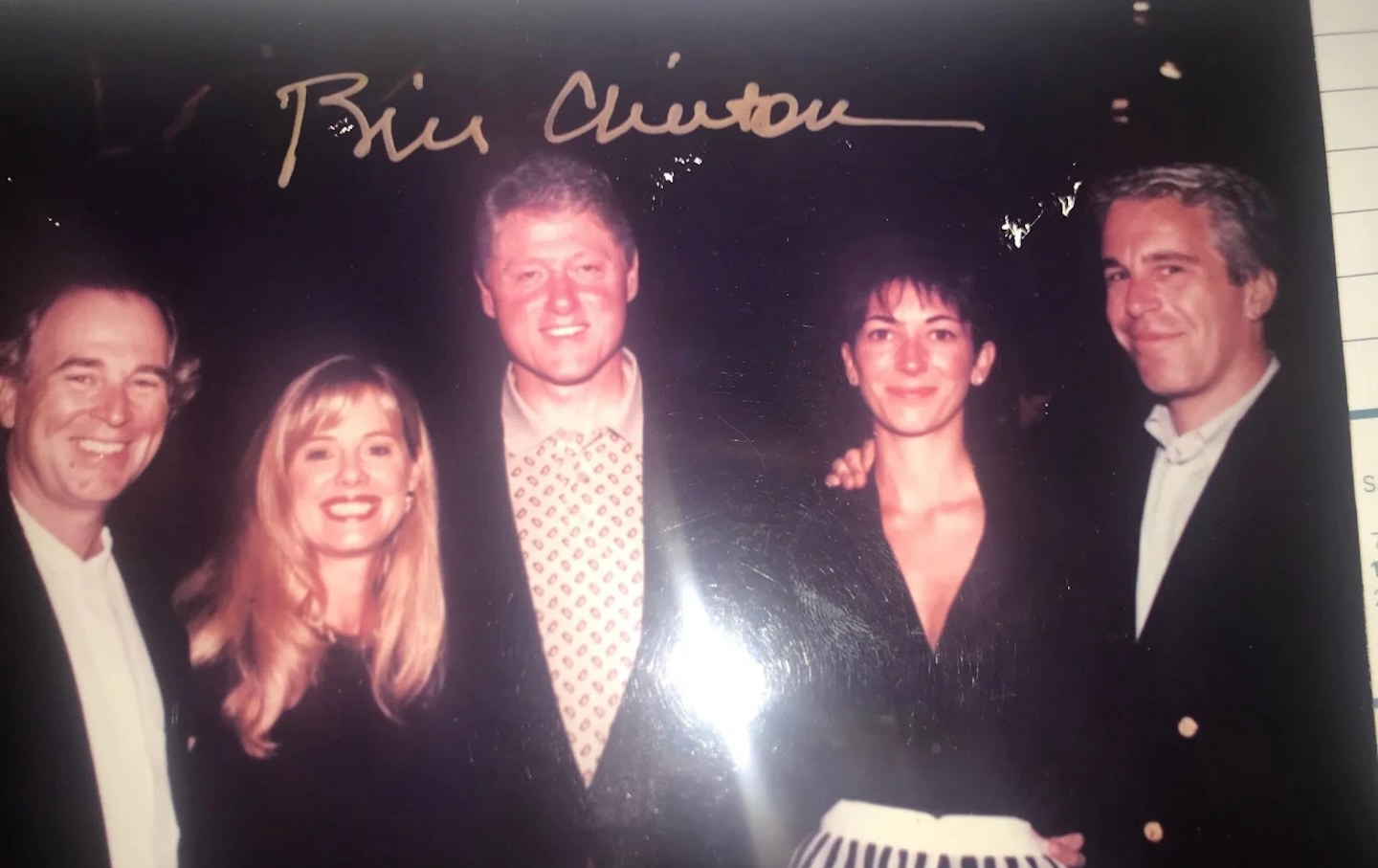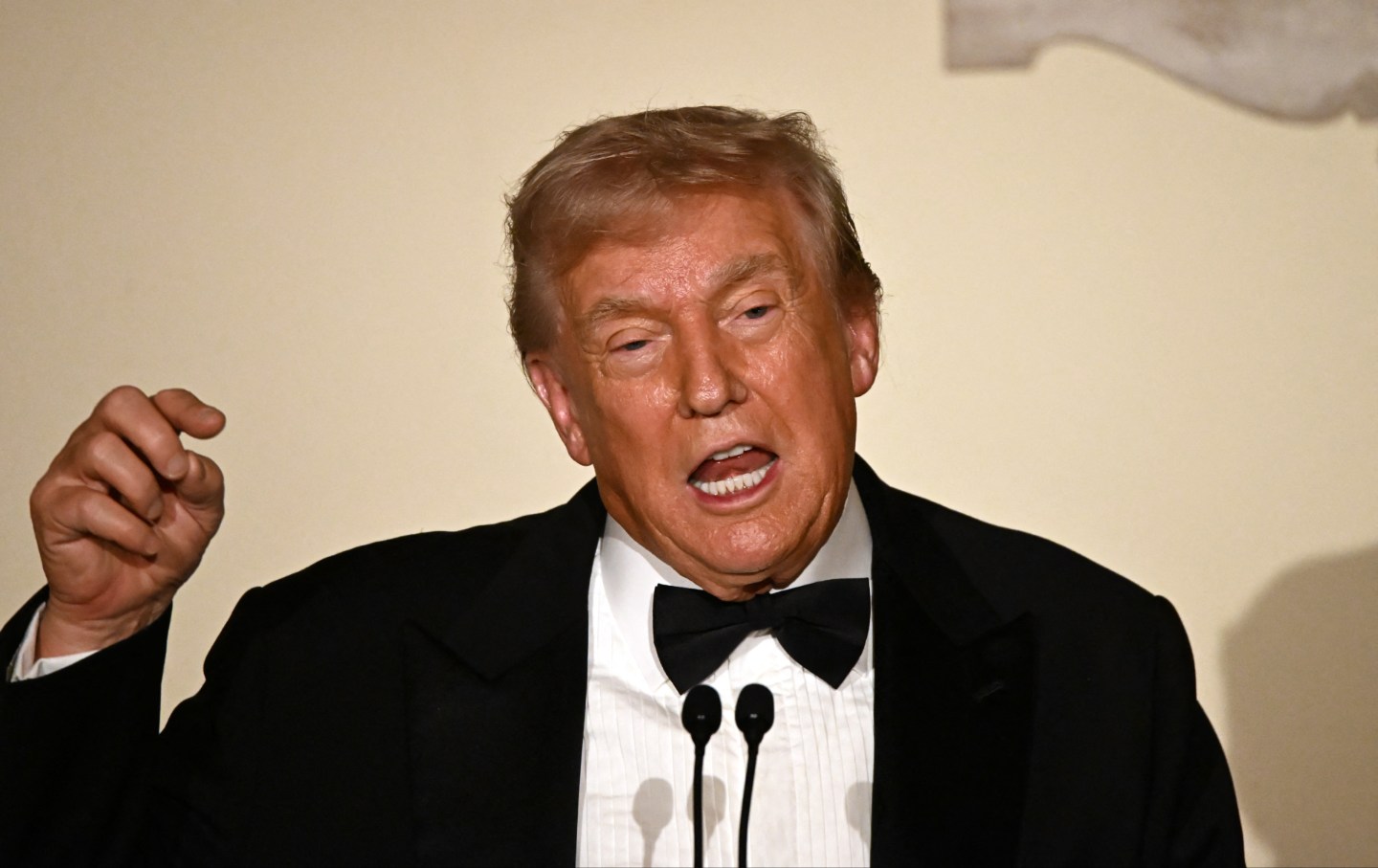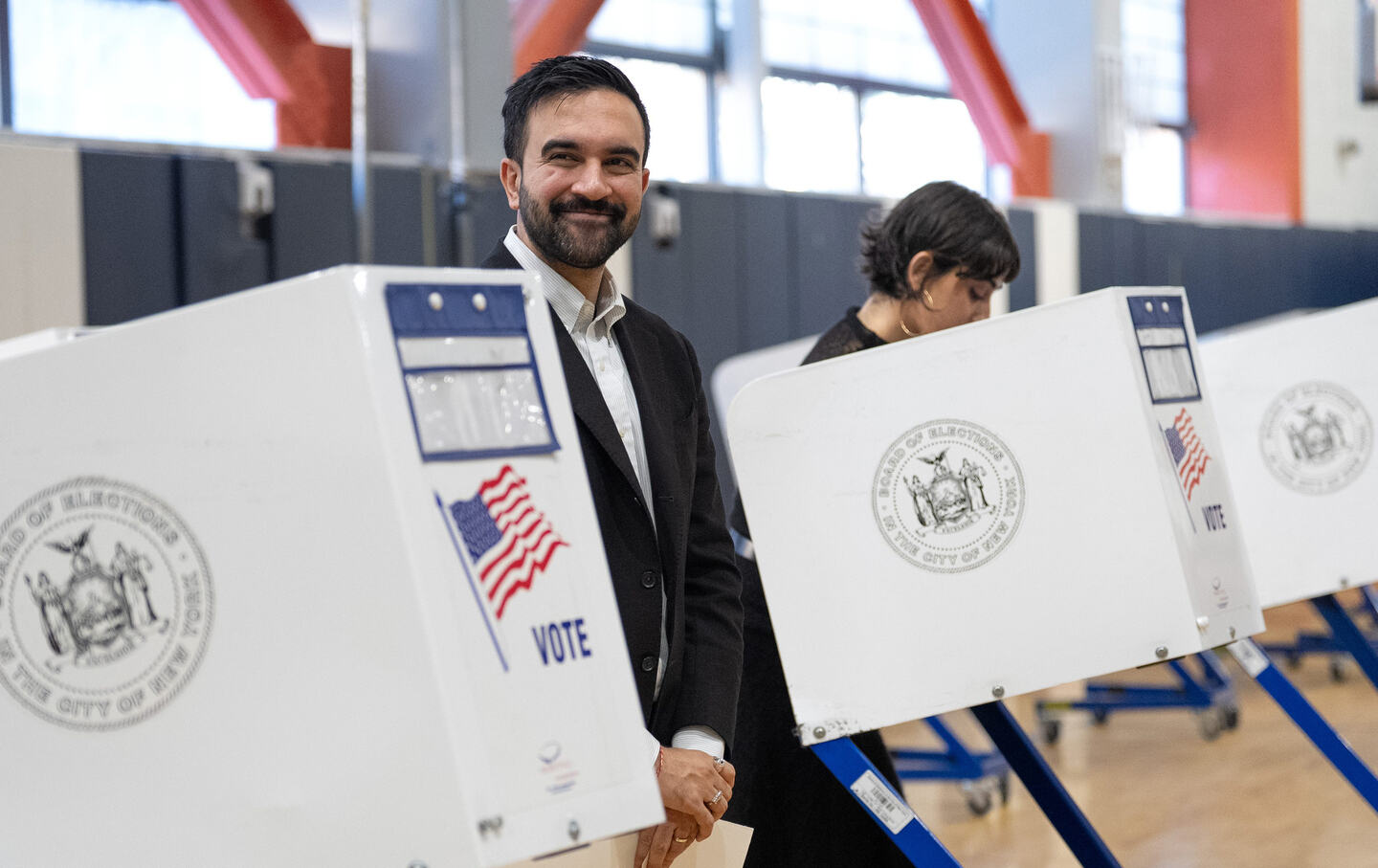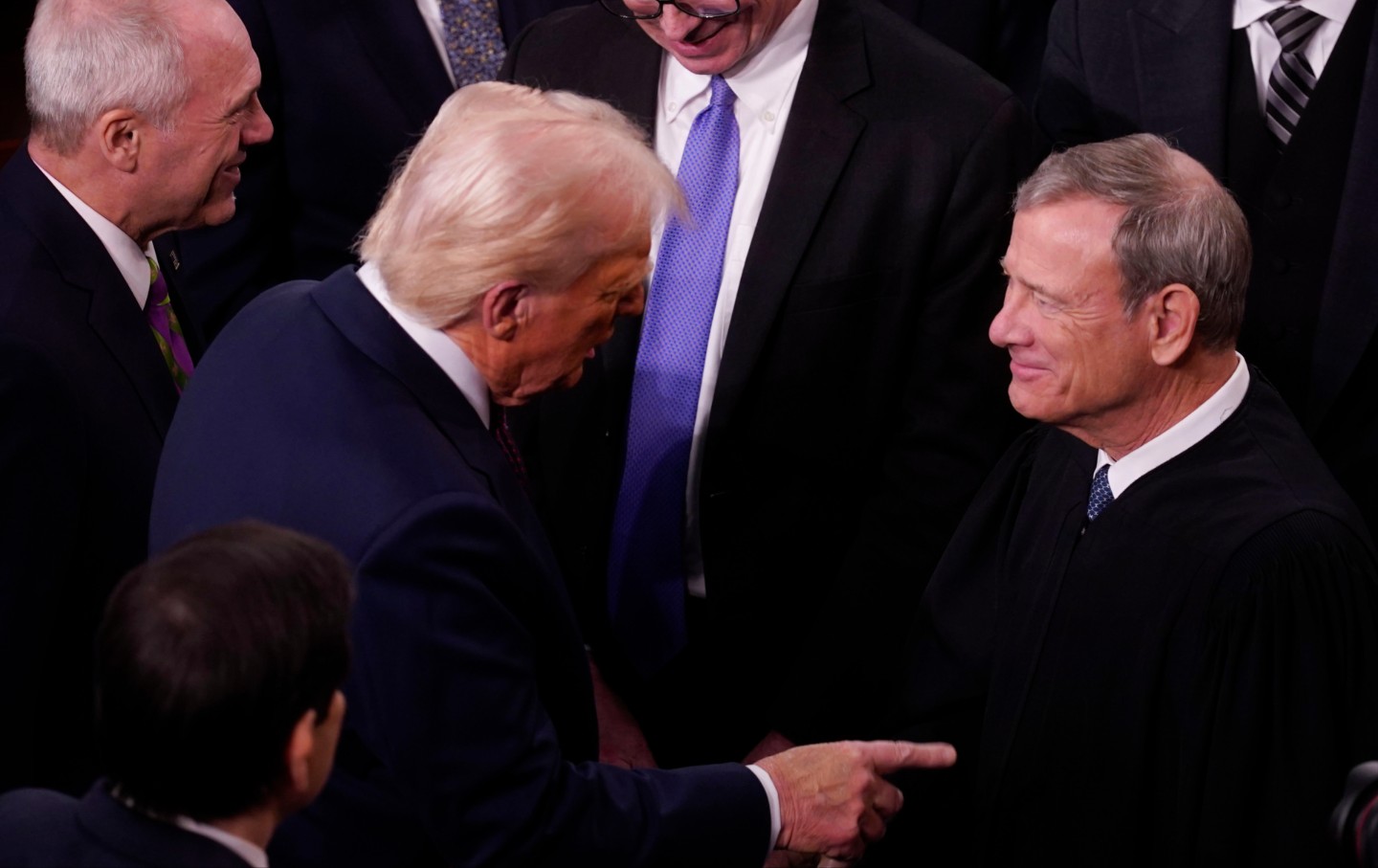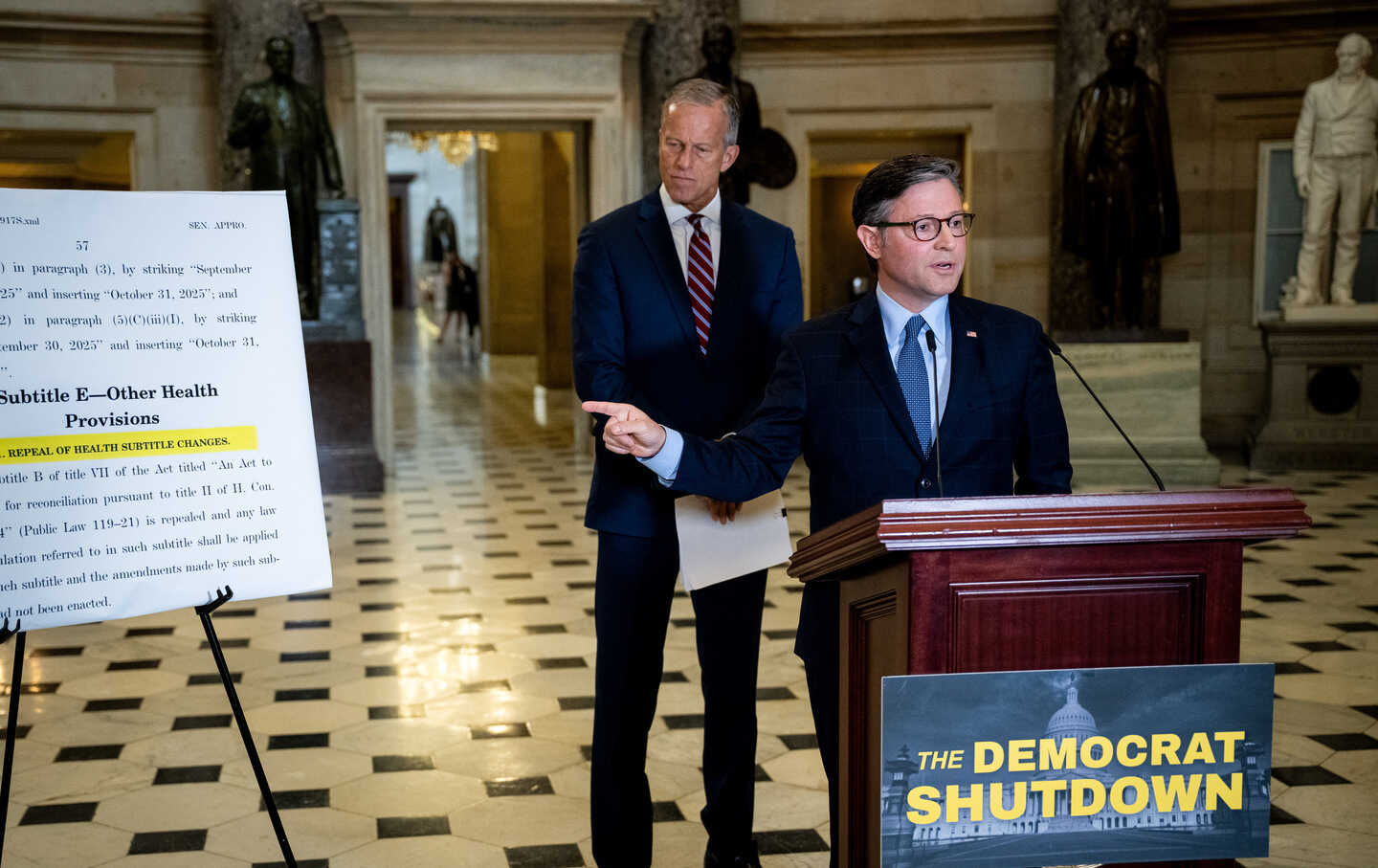Erwin Chemerinsky on the Trump Indictment, Plus Katha Pollitt on Barbie
Erwin Chemerinsky on the Trump Indictment, Plus Katha Pollitt on “Barbie”
On this episode of Start Making Sense, the prosecution strategy against Trump, and the reasons for the success of this year’s biggest blockbuster.

Here's where to find podcasts from The Nation. Political talk without the boring parts, featuring the writers, activists and artists who shape the news, from a progressive perspective.
Should Trump have been charged with incitement of insurrection, or at least violence? What’s the line between free speech and incitement? If Trump sincerely believed he’d won the election, can he still be prosecuted for conspiracy? Erwin Chemerinsky explains – he’s dean of the law school at UC Berkeley.
Also: What’s bad about Barbie the doll, and what’s good about “Barbie” the movie—Katha Pollitt comments.
Our Sponsors:
* Check out Avocado Green Mattress: https://avocadogreenmattress.com
Advertising Inquiries: https://redcircle.com/brands
Privacy & Opt-Out: https://redcircle.com/privacy
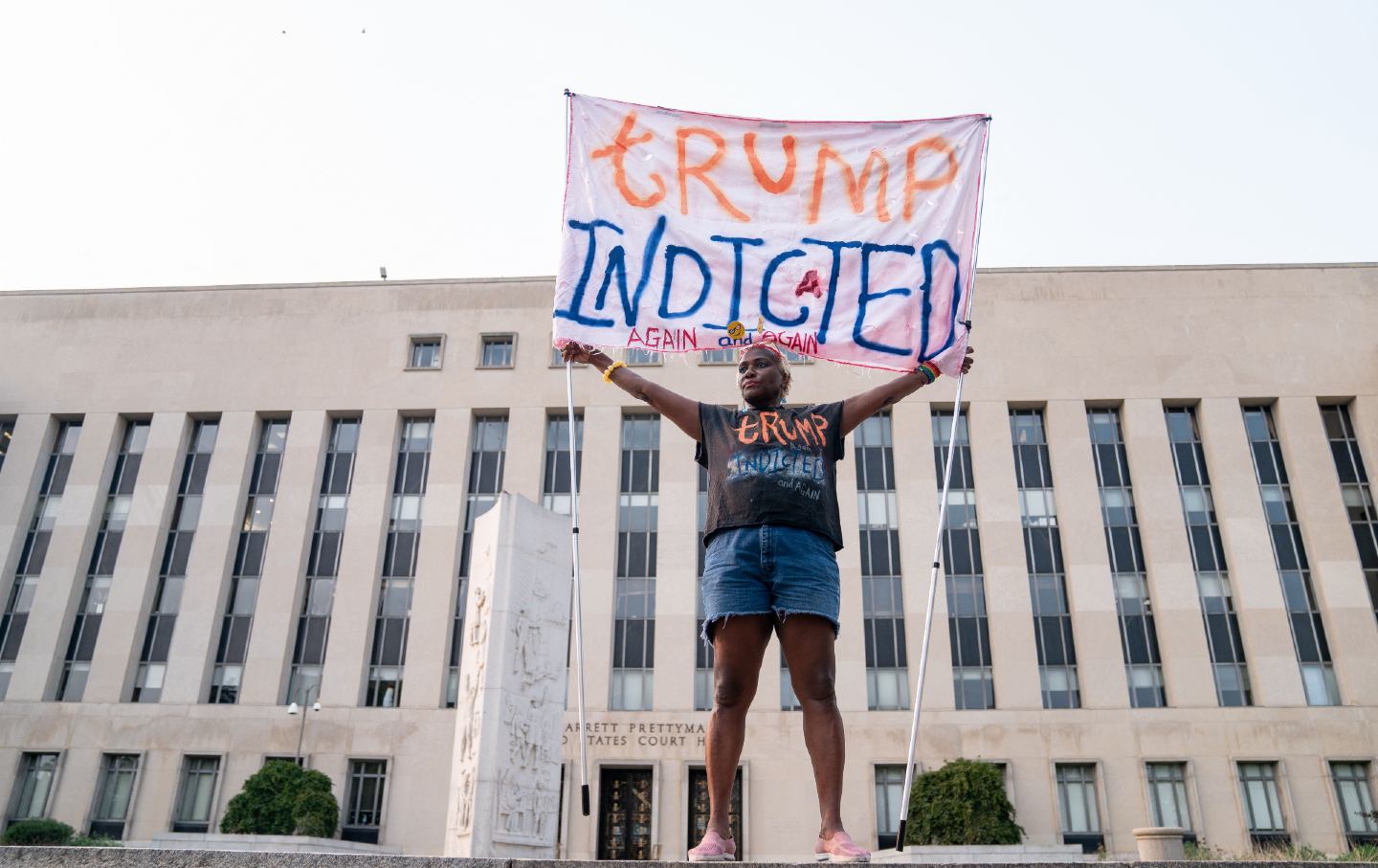
Should Trump have been charged with incitement of insurrection, or at least violence? What’s the line between free speech and incitement? If Trump sincerely believed he’d won the election, can he still be prosecuted for conspiracy? On this episode of the Start Making Sense podcast, the dean of UC Berkeley’s school of law, Erwin Chemerinsky joins to discuss.
Also on this episode: What’s bad about Barbie the doll, and what’s good about Barbie the movie? Nation correspondent Katha Pollitt comments.

Here's where to find podcasts from The Nation. Political talk without the boring parts, featuring the writers, activists and artists who shape the news, from a progressive perspective.
Ths coming Friday is the deadline for the Justice Department to turn over the Epstein files to Congress. But we already know the key fact about Epstein’s famous friends–they didn’t care that he had hired a 14-year-old girl for sex—and gone to jail for it. But why was that? Katha Pollitt comments.
Also: the hidden politics of the New York Times crossword puzzle: Natan Last explains; his new book is Across the Universe: the Past, Present, and Future of the Crossword Puzzle.
Our Sponsors:
* Check out Avocado Green Mattress: https://avocadogreenmattress.com
Advertising Inquiries: https://redcircle.com/brands
Privacy & Opt-Out: https://redcircle.com/privacy
Jon Wiener: From The Nation magazine, this is Start Making Sense. I’m Jon Wiener. Later in the show: What’s bad about Barbie, the doll, and what’s good about “Barbie,” the movie— Katha Pollitt will comment. But first: Erwin Chemerinsky on the indictment of Donald Trump for his January 6 crimes – that’s coming up, in a minute.
[BREAK]
JW: We have some questions about the charges that were brought against Donald Trump in the January 6th case– and about the charges that weren’t brought.
For some answers, we turn to Erwin Chemerinsky. He’s Dean of the Law School at UC Berkeley. He’s a frequent contributor to The New York Times and The LA Times, and he’s the author of something like 15 books, most recently, Worse Than Nothing: The Dangerous Fallacy of Originalism. It’s out now in paperback. We talked about it here a few months ago. Erwin, welcome back.
Erwin Chemerinsky: It’s always a pleasure to talk with you.
JW: The indictment, just to remind our listeners, lays out four felony counts. Conspiracy to defraud the United States, conspiracy to obstruct an official proceeding, obstruction and attempt to obstruct an official proceeding, and conspiracy against voting rights. All of the charges center on the fake elector’s scheme and the effort to pressure vice president Pence to go along with it rather than on the violence of the attack on the Capitol.
So my first question is why didn’t special prosecutor Jack Smith indict Trump for inciting insurrection, or at least for inciting violence? After all, Trump summoned his supporters to Washington, gave that speech urging them to march on the Capitol, and, “Fight like hell,” to keep him in office despite the fact that he had lost the election. And then of course they attacked the capitol. They stopped the counting of the electoral votes, they drove the members of Congress into hiding. They fought the police for hours. So what’s the line between protected speech and incitement?
EC: The indictment recites everything that you just said. However, as you rightly point out, it does not indict president Trump for incitement. I think the reason for that is as you imply the First Amendment. There’s another part of the indictment where it specifically makes clear that president Trump had the right to free speech and that included the right to lie. And I think what the special prosecutor is very concerned with here is had he charged incitement, it would very much make this a case about the First Amendment and where the line is to be drawn in speech. And I think he thought it best to stay away from that constitutional issue.
JW: And where do you think the line should be drawn between free speech and incitement since violence followed in this case?
EC: The Supreme Court has told us where the line is redrawn. It’s a 1969 case, Brandenburg versus Ohio, and it says that speech can be punished if there’s a likelihood of imminent illegal conduct and if the speech is directed at causing imminent illegal conduct.
I’ve looked very carefully at what president Trump said over Twitter and on the Capitol Mall on the morning of January 6th. I think there’s a strong argument that under the Brandenburg test, Trump crossed the line and it became incitement.
I think it was a strategic choice by the special prosecutor not to charge incitement, not to make this a case directly about the First Amendment, but instead to focus on the conduct that did attempt to defraud the United States, that did attempt to interfere with official proceedings, and that did conspire against all of our rights.
JW: Trump’s first line of defense will be to seek a change of venue on the grounds that Washington DC voted something like 94% for Biden. He had almost no supporters in Washington DC. What are the grounds for a change of venue? Who decides and can that decision be appealed?
EC: The district court judge to whom the case is assigned will decide whether to change venue. Anything conceivably can be appealed though it’s very difficult to appeal until after there is a conviction, if there is one. I think there is a very low likelihood of a change in venue. You’d need to show that it’s not possible to get an impartial jury in the area. And the usual way of getting an impartial jury is to question prospective jurors. The idea that more voted for Biden than Trump doesn’t prove that they’re biased against Trump with regard to these legal charges. And that’s the only issue with regard to the change of venue. Can there be an impartial jury with regard to these legal charges?
JW: Let’s talk about intent. Do they have to prove that Trump intended to break the law? Of course, he says he sincerely believed that he had won the election.
EC: The first of the four charges, Conspiracy to defraud the United States, does require showing that president Trump knew that he had lost, but nonetheless attempted to have Congress declare him to be the next president of the United States. I think it’s possible to show through what president Trump has said to others, let alone everything else that we know, that he had this intent. But the reality is that virtually all criminal laws require proof of an intent.
JW: Of course, this has been litigated already quite a bit in the January 6th cases, several defendants have already argued that they invaded the Capitol because they sincerely believed the election had been stolen because the president had told them it had been stolen and they believed the president. But they were convicted anyway of things like trespassing and assaulting the police. Of course, Trump didn’t trespass or assault the police. So are these cases relevant or are they something different?
EC: The cases are something different, those who are prosecuted for trespassing are being prosecuted because they trespassed. Now it has to be shown that they had a criminal intent, that they had the intent to trespass on the Capitol grounds in an illegal way. But that’s been proven.
Donald Trump is not being charged obviously with trespassing. As we were saying a moment ago, he’s not being charged with inciting individuals to trespass, he’s being charged with other crimes. Those crimes have an intent requirement, but I think the special prosecutor has chosen carefully what to charge president Trump for. So he believes he’ll have no trouble showing intent for each of these four charges.
JW: And he also makes the argument about advice of counsel. He says his lawyers told him that what he was doing was legal and therefore he shouldn’t be prosecuted for following the advice of his attorneys.
EC: Following the advice of counsel is not a defense to committing a crime. Because a lawyer says you can do it doesn’t make it lawful if it’s otherwise illegal, especially in this instance where the other lawyers are named as unindicted co-conspirators, I expect that many if not all of them, will soon be indicted. In fact, we’ve already got a federal judge in Southern California, Judge David Carter in the Central District of California, saying that he believed that John Eastman was breaking the law in the advice that he was giving to president Trump.
JW: And of course he was told by other attorneys, namely the acting attorney general and the White House attorneys, that what he was doing was not legal. And I guess you can’t really keep going from lawyer to lawyer until you find one that will tell you what you want to hear.
EC: Advice of counsel doesn’t excuse committing a crime. If I had a lawyer say to me, ‘Well, it’s fine for you to break the speeding law or drug laws or anything else,’ just like ignorance of law is no excuse, advice of counsel is no excuse.
You make the excellent point that you’ve got the former attorney general, the acting attorney general, White House counsel, all telling president Trump that what he’s doing is illegal, that he can find some zealots who are willing to say what he wants to hear isn’t a defense to crime.
JW: And there’s a lot that’s interesting and relevant on the point of his knowledge here. When vice president Pence told him there was no constitutional authority for him to reject or return the electoral votes of the states, Trump said to him, “You’re too honest.”
When the acting attorney general told Trump there was no evidence of fraud significant enough to change the election, his response was, “Just say the election was corrupt and leave the rest to me and the Republican congressman.”
And when the acting attorney general talked about writing an opinion that Pence would not have the authority to reject the electoral college votes, Trump told him, “No one here should be talking to the vice president. I’m talking to the vice president.” In other words, he wanted to keep people from telling the vice president what the Constitution said. And the night before counting the electoral votes, Pence told him, “I don’t have this authority, I’m not going to do it.” And then Trump went out and made the public statement, “The vice president and I are in total agreement that he has the authority to change this.” I assume the prosecution will bring up all of that. How strong is that evidence about Trump’s intent and Trump’s state of mind?
EC: It’s very strong evidence. I’m sure you are right that this is the evidence that the prosecutor will put before the jury. It goes to what we were discussing earlier. There’s the need to show criminal intent. Each of those statements individually and collectively show the criminal intent.
JW: He was also charged with depriving people of their civil rights, namely the right to vote. This is something new. It was not proposed by the House January 6th committee. The law he’s accused of breaking was passed in 1871. Those of us who are historians of reconstruction call it the Ku Klux Klan Act. It made it a crime to deprive people of, in particular, the right to vote. But the law as written, some people have argued, is about preventing individuals from voting. It has nothing to do with preventing Congress from counting the electoral votes of states. Thus, for example, The National Review wrote what Trump did though reprehensible bears no relation to what the 1871 statute covers. What do you think about that argument?
EC: I think the statute is unclear. I understand the argument from The National Review that we usually think of this statute as about threatening or intimidating people to keep them from voting as individuals.
But of course, when you think of a presidential election, all we are voting for in a presidential election is the electors in the electoral college who then are certified by Congress. And if what president Trump is doing is trying to negate the electoral college vote from coming to fruition, isn’t that the same as undermining an individual’s right to vote? What meaning is there to our right to vote? If in the end, the way in which it’s played out in Congress is to choose somebody who’s lost the election as the president of the United States?
JW: We’ve talked here about the flaws in examining the original intent that we think underlies a law, but the original intent of this law was to enforce the 14th Amendment guarantees of equal protection of the laws, especially around voting.
And actually that’s an excellent way of describing what Trump’s real crime was on January 6th. As you’ve suggested, it wasn’t just about Congress counting electoral votes, it was about depriving people of the president they had voted for. And that’s, as you say, the most important issue at stake in this trial.
EC: Exactly right. If keeping one person from voting violates this law, isn’t negating the votes of 75 million people also a violation of this law, even more so?
JW: But does the fact that this law has never been raised in this context, isn’t that relevant here?
EC: Of course, it’s relevant and there’s no doubt that’s what president Trump’s defense will argue. This is a Supreme Court that focuses very much on statutory language, not the intent behind the law. And the crucial question is going to be, did president Trump’s conduct violate this statutory language? It is not going to be ‘what did Congress intend back in the 19th century?’
JW: And let’s talk about the charge of corrupt obstruction of an official proceeding. I understand that from a legal point of view, this is probably the strongest of the charges because in part hundreds of January 6th rioters have already been convicted of that charge. Do you think this will stick in the case of Trump since he didn’t personally invade the Capitol and obstruct the counting of votes?
EC: Everything that president Trump was trying to do in early January of 2021 was oriented to keep Congress from certifying Joe Biden as the president of the United States. He was trying to convince vice president Pence to not certify the election, at least to delay it, or perhaps to recognize alternative slates of delegates so they would make Donald Trump president. Isn’t that all about then obstructing Congress from doing what it was supposed to on January 6th?
JW: Another separate issue, after Trump was indicted, he posted on his Truth Social website. “If you go after me, I’m coming after you.” Does that qualify as witness intimidation or is that a threat against the prosecutors, especially since if he wins reelection, he will be appointing the next attorney general and will be able to, “Go after his enemies?”
EC: And Trump posted that in all caps last week.
JW: Yes.
EC: It’s not clear who it’s directed at. It’s notable that last week when president Trump was arraigned the magistrate judge made a point of admonishing him not to say things that could be perceived as threatening witnesses. That statement certainly sounds like it’s threatening people, and I expect that the federal judge who’s now taking the case will admonish president Trump not to make such statements that sound like witness intimidation.
Of course, the judge also has the possibility of imposing a gag order on president Trump to keep him from speaking about these proceedings. How that will be enforced, especially in somebody who’s running for president of the United States, is also an unprecedented question.
JW: Will he go to prison for these charges? The penalties in the statute are pretty extended. On the other hand, The New York Times had this big article reminding us that he’s entitled to Secret Service protection for the rest of his life, even if he’s in prison. So we’re in another unprecedented territory here.
EC: That’s what I think is so important that we’ve never seen anything like this before in American history. Obviously, the question of whether he goes to prison is going to turn on what he’s convicted of. Is he convicted on one charge or four charges? We also have to remember at this point, this is only one of three indictments against president Trump. There’s the indictment in New York State Court about authorizing the hush money to be paid to Stormy Daniels.
There’s the indictment in federal court in Florida for the unauthorized possession of classified documents and the obstruction of justice with regard to that.
It’s likely there may be an indictment in Georgia State Court with regard to the statement that the Secretary of State should find him another 11,000 plus votes. So it’s so hard to predict– will Donald Trump be sentenced to prison, and for how long, given all of the indictments that are out there.
Also, judges will take into account his age and the circumstances. But the idea you point out, of a former president being in prison with his Secret Service agents, is mind-boggling.
JW: One final thing: if Trump is convicted on the January 6th charges, do you think that will meet the 14th Amendment standard for disqualifying him from serving as president even if he wins the election? That 14th amendment Section 3 says, no person shall hold federal office who has “engaged in insurrection or rebellion.” This was of course aimed at former Confederate officials.
Of course, he was not charged with the crime of assisting, inciting, or engaging in a rebellion or insurrection. But the common understanding of insurrection is an action taken against the government to remove a legitimate leader and replace him with an illegitimate leader. And that is, of course, what Trump and his allies attempted to do.
Jamie Raskin, Maryland, Democrat, a former constitutional law professor, said Trump, “Really does fulfill exactly the constitutional prohibition there.” I wonder if you agree with Jamie Raskin that conviction on these charges meets the 14th Amendment standard for disqualification from serving as president?
EC: The difficulty with Section 3 of the 14th Amendment is it doesn’t define what it means by insurrection or rebellion. And even more important, it doesn’t define who is to make that determination.
Does Congress have to make that determination that Section 3 is met? Can each state determine on its own? I expect there’s going to be litigation in many states to keep Donald Trump off the ballot on the grounds that he engaged in insurrection.
So there’s the possibility, even if he’s not convicted, it can be argued that he participated in insurrection and be kept off the ballot. And there’s also the argument that says even if he’s convicted of these charges, none of them are about insurrection and therefore he can’t be kept off the ballot. My own conclusion would be like Jamie Raskin’s, and I think there’s going to be litigation in state courts, but again, we’re in such unprecedented territory.
I think what’s so important to keep foremost in mind is this is about the president of the United States attempting a coup to stay in power after he had lost. There’s been no trial in history more important than this in the United States. And this is all evidence that shows that’s exactly what president Trump was trying to do.
JW: Erwin Chemerinsky, he’s Dean of the Law School at UC Berkeley. Erwin, thanks for helping us today.
EC: Truly my pleasure.
[BREAK]
Jon Wiener, host: The number one movie in the world right now is not Spider-Man, it’s not Batman or Ant-Man or Captain Marvel. It’s Barbie, with more than $1 billion in ticket sales as of last weekend. And it’s probably the most explicitly feminist movie ever made. For comment, we turn to our most explicitly feminist writer, Katha Pollitt. Of course, she’s a poet, essayist, and award-winning columnist for The Nation. Her work has also appeared in The New Yorker, The Atlantic, and The New York Times, and her most recent book is Pro: Reclaiming Abortion Rights. Katha, welcome back.
Katha Pollitt: Hi, Jon. Thanks for having me on the show.
JW: Two questions at the top here: Were you ever a Barbie fan, and did you like the Barbie movie?
KP: I was never a Barbie fan. I thought Barbie was tacky. I think I had one, but I was 11 when Barbie came out, so I missed it. I loved the movie. I thought the movie was hilarious and visually splendiferous.
JW: Of course, feminists have always said Barbie is bad for girls because it makes them hate their bodies, because they are not blondes with tiny waists and big breasts. Did you agree with that for the last 40 years?
KP: I do agree with that – and science backs me up. There’s a study where they gave a variety of different dolls to little girls, and the ones that got the ones that were busty and thin and with really exaggeratedly long legs, hated their bodies more. You can always do this. You can always say, ‘Well, it’s not Barbie, it’s this other thing.’ It’s everything, altogether, but Barbie is in there, doing her work.
JW: You have a daughter. What was your Barbie policy with her when she was little?
KP: Oh, that was funny. Well, when she was about, I don’t know, maybe four, she wanted a Barbie, and I explained to her that Barbie was unrealistic and all that. But eventually, so as not to fetishize it, I gave her a Barbie. But I had bad talked Barbie so much, before you knew it, Barbie was a bath toy. She was in there with the rubber duck. And that was the end of Barbie at our house.
JW: Well, turning to the movie here, I did notice the gender roles in Barbie are very traditional. There are Barbies, there are Kens, and that is it. There’s no lesbian Barbie. There’s no bi Barbie. Barbie is not a ‘they’.
KP: Barbie has no sex. Barbie does not have – yes, she actually says to the construction workers who are hassling her on Venice Beach, “I don’t have a vagina.” Funny.
JW: But there was a pregnant Barbie, that was Midge, in 2002. It had, I have learned, a detachable magnetic pregnant stomach, which you could open up to find a small plastic baby curled up inside. What happened to the magnetic pregnant Barbie?
KP: Well, this is funny, because you would think that conservatives would love pregnant Midge, because they wouldn’t love the idea of Barbie as just having all these careers and not being maternal. But they didn’t like it, for whatever reason, and so that was the end of Midge. Now, in the movie, this is funny, there’s a character named Alan, and I spent the whole movie thinking, who is Alan supposed to be? Alan was the husband of Midge. Midge was married, of course, and she had this husband, and in the movie, he’s just wandering around, wondering what’s what, has no place in the Barbie world.
JW: And then, there was a Growing up Skipper in 1975, Barbie’s younger sister, who was meant to educate young girls about the realities of puberty, rotating her left arm made her breasts grow. Skipper was pulled off the market pretty quickly. Do you know why?
KP: I don’t know. It seems a little too complicated, doesn’t it?
JW: I thought it was probably because rotating your arm does not give you big breasts.
KP: No, you have to say, “I must, I must improve my bust.”
JW: That’s a different movie. And there’ve been a lot of other Barbies. Remind us about that.
KP: She’s had over 200 careers: doctor, veterinarian, ballerina, chef, cupcake chef, lifeguard, president. There’s Barbies of every race and skin tone now. There’s been Barbies intended to make girls feel better about their bodies, like Wheelchair Barbie, Down’s Syndrome Barbie, Vitiligo Barbie, Prosthetic Leg Barbie, and Bald Barbie. And then, get this, there’s also, Curvy Barbie, who is actually normal weight Barbie.
JW: Mattel has obviously become aware of the feminist critique about body image. The movie winks at the feminist critique by having our protagonist describe herself as Stereotypical Barbie, and she learns a lot from Weird Barbie, that’s Kate McKinnon, who’s fabulous here. Stereotypical Barbie wants to, in her words, “be real,” but I would think the point of being real, first of all, would be not to look like Stereotypical Barbie. And that, of course, is the one thing Mattel does not want to say.
KP: Exactly. The movie does a wonderful thing where suddenly, Barbie’s feet go flat, and then later, when she’s in the real world, she’s wearing these high heels, and she says, “Oh my God, if I were a real woman, I would never wear these shoes.”
JW: Remember the Barbie Liberation Organization of 1992? This was after Mattel released Teen Talk Barbie, which had a voice box. You’d press the button, and it said four things, including, “Math class is tough.” The Barbie Liberation Organization, BLO, took Barbies off the shelves of big box toy stores, along with GI Joe dolls, and switched the voice boxes, so the GI Joe said, “I love shopping,” and Barbie said, “Vengeance is mine.” And then they put the dolls back in the boxes and put the boxes back in the stores. They called it “reverse shoplifting.”
KP: That is really funny, that’s wonderful. Well, it’s interesting, isn’t it, that Barbie gets a lot of attention for her various political and feminist failings, no one ever talks about GI Joe. Here, we give children a soldier doll, in a very warlike society, with an enormous militaristic arms budget and all the rest, and constant intervention in war, and that’s all fine. Being a man is not seen as complicated in the way that being a woman is.
JW: Greta Gerwig, in a recent New York Times Magazine profile, said the achievement of the Barbie movie was, “Doing the thing and subverting the thing.” Maybe she’s talking about the part in the movie where Barbie tells Gloria, her articulate friend in the real world, “By giving voice to the cognitive dissonance required to be a woman under the patriarchy, you’ve robbed it of its power.” Of course, that’s a joke for the gender studies grad students in the audience.
KP: That was pretty funny, and I’m not sure that it’s true either.
JW: I do wonder if you agree with Greta Gerwig, that the film subverts Barbie?
KP: I think it goes as far to subvert Barbie as it is possible to go in a mass market movie that is produced by Mattel. But I was thinking about this ever since I wrote my piece, there’s this wonderful, glorious rant by America Ferrera, playing Gloria, the friend, who is a receptionist at Mattel, and the mother of a very sullen Barbie-hating middle schooler, and she talks about these many double binds, and everybody can relate to this. “You have to be thin but not too thin, and you can never say you want to be thin – you have to say you want to be healthy, but also you have to be thin. You’re supposed to love being a mother, but don’t talk about your kids all the damn time. Never get old, never be rude, never show off, never be selfish. It’s too hard, it’s too contradictory, and nobody gives you a medal or says ‘thank you.’ And it turns out, in fact, that not only are you doing everything wrong, but also, everything is your fault.” I used to keep a list of things that people said were women’s faults. It got very long, that list.
JW: One other great moment of Barbie’s friend, Gloria, she’s been secretly drawing these rogue Barbies, Crippling Shame Barbie and Irrepressible Thoughts of Death Barbie.
KP: Yes, and that’s what sets up – Barbie channels these thoughts, and that’s what sets her off in the real world, and having these irrepressible thoughts of death, I thought that was pretty great. That was very existentialist, wasn’t it?
JW: It was. One of our former colleagues at The Nation magazine, Christine Smallwood, wrote recently in the magazine, n+1, “If I’m going to be spiritually murdered by capitalism and nostalgia, I don’t want to be winked at while it’s happening.” I thought that was pretty good.
KP: I think people do want to be winked at while it’s happening.
JW: Okay.
KP: This movie is very successful. Even in China, I just heard today on the radio, that at first, it didn’t go over so well, and the Chinese weren’t so keen on it, the government wasn’t so keen on it, but everybody loves it, and the reason they love it is because China has become an extremely sexist place, and this is a way for women to rebel. So I think people make their resistance where they can out of the materials that are available, and right now, this movie is available.
JW: My friend Jon Powers argues that the real feminist meaning of the film is that it’s the most successful movie ever made by a woman, and that Greta Gerwig made a film that’s made $1 billion and is critically admired, and that’s the real important part of Barbie, rather than anything in its ideas. I wonder if you agree with that?
KP: Well, of course I would’ve preferred if the most feminist movie ever made, that made $1 billion, was The Life of Simone de Beauvoir.
JW: Yes.
KP: That would’ve been better. But in this world, it’s a truly amazing success. When I went, which was opening night, in Westbrook, Connecticut, there were all these people, some of whom were men, and they were wearing pink, and one older woman had brought her Barbies, she had Barbies back from the ’60s. So this is something people can really relate to because it’s about their childhood.
JW: But unfortunately, as Michelle Goldberg pointed out in her New York Times column, the lesson Hollywood is taking from the $1 billion success of Barbie is not to make more stories for girls and women, but to make more movies about toys. She says there are 14 movies based on Mattel intellectual property that have been announced, including features about the 1980s action figure, He-Man, and the boxing game, Rock ‘Em Sock ‘Em Robots.
KP: It’s like people have totally run out of ideas, and so they ransack the recent past for obscure toys. It’s ridiculous.
JW: Who is missing from Barbie Land?
KP: Well, in Barbie Land, there’s no “Frumpy Barbie. No “Too Busy to Care About my Hair” Barbie. No “I Hate to Shop” Barbie. No “Don’t Bother Me, I’m Writing” Barbie. I’d like to have that one.
JW: The official Barbie message is that girls can be anything. But – but what?
KP: But you still have to be gorgeous while you’re doing it.
JW: And what if Stereotypical Barbie actually ran for president in the real world?
KP: Yeah, that would really be quite something. People would call her an overambitious bottle blonde clotheshorse, and then Ken would sell his story to The National Enquirer: “Barbie’s Tragic Secret: She Hates Kids.” And Fox would give him his own show.
JW: Katha Pollitt. You can read her new column, “The Double Bind of Greta Gerwig’s Barbie,” at thenation.com. Thank you, Katha.
KP: Thanks so much for having me, Jon.
Subscribe to The Nation to Support all of our podcasts
Disobey authoritarians, support The Nation
Over the past year you’ve read Nation writers like Elie Mystal, Kaveh Akbar, John Nichols, Joan Walsh, Bryce Covert, Dave Zirin, Jeet Heer, Michael T. Klare, Katha Pollitt, Amy Littlefield, Gregg Gonsalves, and Sasha Abramsky take on the Trump family’s corruption, set the record straight about Robert F. Kennedy Jr.’s catastrophic Make America Healthy Again movement, survey the fallout and human cost of the DOGE wrecking ball, anticipate the Supreme Court’s dangerous antidemocratic rulings, and amplify successful tactics of resistance on the streets and in Congress.
We publish these stories because when members of our communities are being abducted, household debt is climbing, and AI data centers are causing water and electricity shortages, we have a duty as journalists to do all we can to inform the public.
In 2026, our aim is to do more than ever before—but we need your support to make that happen.
Through December 31, a generous donor will match all donations up to $75,000. That means that your contribution will be doubled, dollar for dollar. If we hit the full match, we’ll be starting 2026 with $150,000 to invest in the stories that impact real people’s lives—the kinds of stories that billionaire-owned, corporate-backed outlets aren’t covering.
With your support, our team will publish major stories that the president and his allies won’t want you to read. We’ll cover the emerging military-tech industrial complex and matters of war, peace, and surveillance, as well as the affordability crisis, hunger, housing, healthcare, the environment, attacks on reproductive rights, and much more. At the same time, we’ll imagine alternatives to Trumpian rule and uplift efforts to create a better world, here and now.
While your gift has twice the impact, I’m asking you to support The Nation with a donation today. You’ll empower the journalists, editors, and fact-checkers best equipped to hold this authoritarian administration to account.
I hope you won’t miss this moment—donate to The Nation today.
Onward,
Katrina vanden Heuvel
Editor and publisher, The Nation

